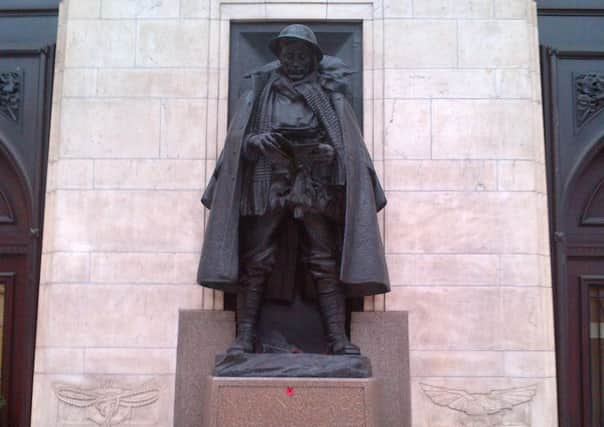New Gaelic book of letters to Unknown Soldier


Litir Chun an t-Saighdeir gun Ainm / Letter to the Unknown Soldier was commissioned by the 14-18 Now World War One centenary art commemoration project.
It drew its inspiration from a bronze memorial, in Paddington Station in London, of a life-size statue of a soldier in trench uniform reading a letter (pictured). No-one knows who the letter was from and what it contained.
Advertisement
Hide AdAdvertisement
Hide AdThe BBC was invited to participate in encouraging radio listeners to take a moment and write that letter.
BBC Radio Four and Radio nan Gaidheal embraced the project and listeners of all ages stepped back in time to 1914-18 and the First World War to pen personal letters to family members and loved ones.
More than 50 letters were written and broadcast in Gaelic and they make up this unique collection compiled 100 years after the World War One.
Project creators Neil Bartlett and Kate Pullinger were deeply moved at the response with over 21,000 letters received in total and stated: “People wrote from across Britain, and across the world.....they wrote from different places, different generations and different points of view - and sometimes in different languages.
Advertisement
Hide AdAdvertisement
Hide Ad“Perhaps we shouldn’t have been surprised that the idea of writing a letter to a lost soldier would resonate so strongly in the Gaelic-speaking parts of Britain, when these regions were hit especially hard by the death-toll of the First World War.
“By writing to him in Gaelic, people have made us remember just how many soldiers would have spoken that language.”
The letters in this collection were written using a range of styles, some composed from the perspective of family members, mothers, sisters, brothers, trying to imagine what the soldier might be experiencing - they passed on news of the community they left behind with some trying to keep things light for the reader.
This young writer conveyed the mood of many young boys at the time: “Murdo and I were fishing down at the river today. I gave him my fishing rod and I used your one. I caught three trout and Murdo caught two. I wish I was old enough to be in the Army. I envy you. Two more years though and I’ll be old enough. If I’m lucky the War will still be on!“
Advertisement
Hide AdAdvertisement
Hide AdSome of the letters are written in the form of poems and reflect the feelings and memories of loved ones and others wrote letters between soldiers taking us directly into the dirt, devastation and death of the trenches, questioning the purpose of war: “Who are you? The question is pointless. The hungry soil of France and Belgium swallowed you all, and it took four years to satisfy it.”
And poignant thoughts on the many who did not return are expressed in many: “Don’t be afraid. This silence will not last long. You will rise, brave fighter, and you will leave your gun and bayonet behind. You will find a familiar road and you will follow their voices back to the landscape of your youth...”
The publication of the collection of letters came about from a collaboration between the BBC, the Gaelic Publishing House CLÀR with support from The Gaelic Books Council.
Margaret Mary Murray, Head of BBC Gaelic Services, said: “A letter is a very precious thing and particularly so in this situation with the reader thousands of miles away from the writer and in the throes of war.
Advertisement
Hide AdAdvertisement
Hide Ad“Radio nan Gaidheal listeners of all ages embraced the creative letter writing challenge and explored themes of family, community, love and loss. The act of reading the letters aloud for broadcast added further emotion.”
Rosemary Ward, Director of The Gaelic Books Council said: “When we heard the writers reading their letters on Radio nan Gaidheal, we thought it would be a huge loss if the letters weren’t published in a book, and we recommended publication to the BBC. The BBC accepted our recommendation and the Gaelic Books Council was very happy to support CLAR to get this special publication into print.
“Congratulations to all those involved in this excellent initiative.”
Lisa Storey from the publisher CLÀR added: “It’s great to see so many different Gaelic writers, especially younger ones, coming forward for this book.
Advertisement
Hide AdAdvertisement
Hide Ad“CLÀR were only too happy to work with BBC Radio nan Gaidheal on this.”
The launch event takes place this Saturday (March 12) at the Aye Write Book festival in Glasgow’s Mitchell Library at 3pm.
The session will be chaired by Allan Campbell and will include representatives of 14-18 NOW and the BBC.
Some of the letter writers will share the story and emotions within their Letter to the Unknown Soldier.